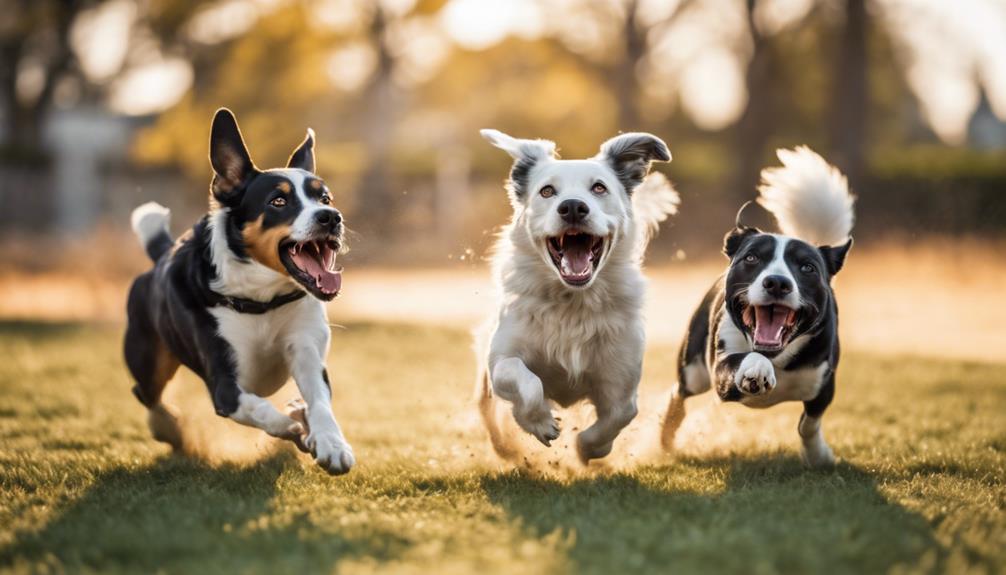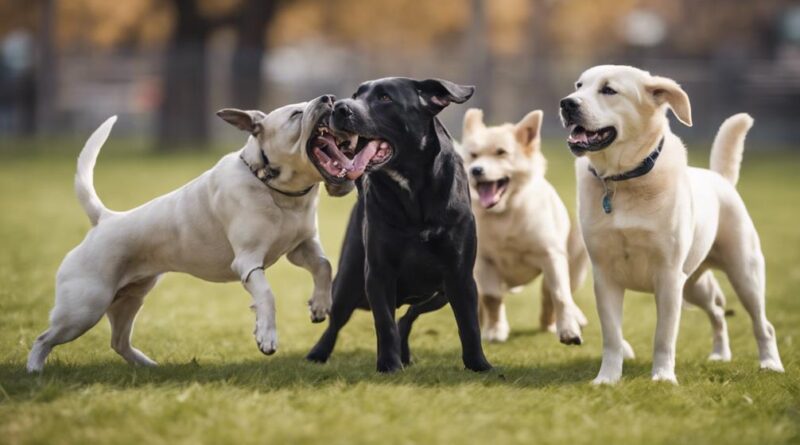What Shapes Your Dog's Social Behavior?
Ever wondered why your furry companion acts like they're the leader of a secret society when they encounter other dogs at the park?
Well, there's more to your dog's social behavior than meets the eye.
From their innate pack mentality to the way you interact with them, various factors play a role in shaping how they navigate the world of canine social dynamics.
Understanding these influences can shed light on your pup's behavior and enhance your bond with them.
Canine Pack Mentality
If you observe your dog closely, you'll notice how their behavior is deeply influenced by their instinctual pack mentality. Dogs are social animals that thrive in a pack hierarchy where each member has a specific role. Understanding this pack hierarchy is crucial in comprehending your dog's behavior. In a pack, there's a leader, often referred to as the alpha, followed by beta members and so on. Your dog views your family as its pack, and they naturally look to you as the leader.
Social bonding is a fundamental aspect of your dog's pack mentality. Dogs form strong bonds with their pack members, which in a domestic setting includes you and your family. This bonding is crucial for their emotional well-being and overall happiness. By engaging in activities together, such as playtime, training, and simply spending quality time, you strengthen the bond with your dog, reinforcing their sense of belonging within the family pack. Understanding and nurturing this pack mentality in your dog is essential for a harmonious coexistence and a happy, well-adjusted pet.
Early Socialization Impact
Early socialization plays a crucial role in shaping your dog's behavior and temperament for the rest of their life. During the critical period of social development, exposure to various stimuli and experiences greatly influences how your dog will interact with the world around them.
Here are some key points to consider regarding the impact of early socialization:
- Socialization Techniques: Introducing your puppy to different people, animals, environments, and situations helps them become well-adjusted adults.
- Critical Period: The first few months of your puppy's life are particularly important for socialization to positively impact their behavior in the long term.
- Impact of Social Play: Engaging in social play with other dogs allows your puppy to learn appropriate social cues and behaviors.
- Puppy Classes: Enrolling your puppy in puppy classes provides structured socialization opportunities under the guidance of professionals.
- Long-Term Effects: Proper early socialization can lead to a more confident, less anxious, and better-behaved adult dog.
Breed Influence on Behavior
Understanding how a dog's breed influences its behavior is essential for responsible pet ownership and effective training. Different breeds have genetic predispositions that shape their personalities and behaviors. For example, herding breeds like Border Collies may display a strong instinct to chase and control movement, while hound breeds like Beagles are known for their keen sense of smell and tendency to follow scents. These breed-specific traits can impact how your dog interacts with others and responds to various stimuli in its environment.
When choosing a dog breed, it's important to consider these inherent characteristics to ensure a good match with your lifestyle and expectations. While training and socialization can help modify certain behaviors, understanding your dog's breed tendencies can provide valuable insights into its needs and preferences. By recognizing and appreciating the unique qualities of your dog's breed, you can better support its development and create a harmonious relationship based on mutual understanding and respect.
Human-Canine Relationship Dynamics
Exploring the intricate dynamics between humans and their canine companions sheds light on the depth of the bond shared between them. Understanding the nuances of the human-canine relationship dynamics can tremendously impact your interactions with your furry friend.
- Canine Body Language: Paying attention to your dog's body language is crucial in deciphering their feelings and intentions. From tail wagging to ear positioning, dogs communicate a lot through their body.
- Human Interaction: Your behavior towards your dog significantly influences their social behavior. Positive interactions like playtime and training sessions foster a strong bond.
- Communication: Effective communication is key in building a healthy relationship. Using clear cues and commands helps establish mutual understanding.
- Trust Building: Consistency, respect, and patience are essential in building trust with your dog. Trust forms the foundation of a strong human-canine bond.
- Emotional Connection: Dogs are highly emotional beings. Nurturing an emotional connection through affection and empathy strengthens the bond between you and your dog.
Environmental Factors at Play
When considering your dog's social behavior, it's crucial to acknowledge the impact of environmental factors at play. Genetic predispositions play a significant role in shaping how your dog interacts with others. Certain breeds may have inherent tendencies towards being more sociable or reserved, affecting how they navigate social situations. Additionally, socialization experiences during your dog's formative months can greatly influence their behavior later in life. Exposing your dog to a variety of people, animals, and environments helps them develop crucial social skills and confidence.
The environment in which your dog grows up, including the presence of other pets, family dynamics, and living conditions, can all impact their social behavior. Dogs raised in a stimulating and positive environment tend to exhibit more social and friendly behaviors, while those raised in isolation or negative surroundings may struggle with social interactions. As a responsible pet owner, providing a nurturing and enriching environment for your dog is essential in fostering healthy social behaviors.
Canine Communication Methods
Canines communicate through a complex system of body language, vocalizations, and scent cues to convey their thoughts and emotions effectively. Understanding how dogs communicate can help you better interpret your furry friend's needs and feelings.
Here are some key ways dogs communicate with each other and with humans:
- Body Language: Dogs use various body postures and movements to express themselves. For example, a wagging tail can indicate happiness, while a lowered head and body may signal submission or fear.
- Vocalization: Dogs bark, growl, whine, and howl to communicate different emotions. A playful bark may invite interaction, while a deep growl can signify aggression or warning.
- Facial Expressions: Just like humans, dogs have facial expressions that convey their moods. A relaxed mouth and soft eyes often indicate a calm and content dog.
- Scent Marking: Dogs use urine and scent glands to mark their territory and communicate with other dogs. This behavior helps establish boundaries and convey information about the dog's identity and reproductive status.
- Touch: Dogs use physical contact to show affection, establish dominance, or seek comfort. Pay attention to how your dog responds to touch to understand their communication cues better.
Role of Play in Socialization

Engaging in play is a crucial aspect of your dog's socialization process, fostering important skills and interactions with other dogs and humans. Play preferences vary among dogs, with some enjoying rough and tumble play while others prefer gentle interactions. These preferences shape how they engage with different playmates and contribute to their social development.
Through play, dogs establish social bonds with both their canine companions and humans. Playful interactions help build trust, communication, and cooperation, strengthening the relationships between dogs and their play partners. Whether it's chasing a ball, engaging in a game of tug-of-war, or simply romping around, these playful activities are instrumental in fostering social bonding.
Additionally, play provides an outlet for dogs to learn social cues, practice impulse control, and develop important social skills such as sharing and taking turns. It also helps them burn off excess energy, reducing the likelihood of behavioral issues due to boredom or pent-up energy. By encouraging and facilitating play, you can support your dog's socialization process and help them become well-rounded and socially adept companions.
Training and Behavior Modification
To effectively shape your dog's behavior and address any training needs, consistency in your approach is key. Positive reinforcement is a powerful tool in training your dog, as it rewards desired behaviors, making them more likely to be repeated. Behavior shaping involves breaking down complex behaviors into smaller achievable steps, gradually guiding your dog towards the desired outcome.
Here are some key points to keep in mind when training your furry friend:
- Use Positive Reinforcement: Reward good behavior with treats, praise, or playtime to encourage your dog to repeat the behavior.
- Be Consistent: Stick to the same commands and rules to avoid confusion and help your dog understand what's expected.
- Set Clear Expectations: Communicate clearly what behaviors are acceptable and unacceptable to prevent misunderstandings.
- Practice Patience: Training takes time, so be patient and understanding with your dog as they learn new behaviors.
- Seek Professional Help: If you're struggling to modify your dog's behavior, consider seeking assistance from a professional trainer or behaviorist.
Frequently Asked Questions
How Does a Dog's Diet Affect Their Social Behavior?
Your dog's diet plays a significant role in their social behavior. The nutrition impact on your furry friend can lead to behavior changes, affecting how they interact with other dogs and humans.
A balanced diet can promote positive social interactions, while a lack of essential nutrients might result in mood swings or irritability.
Ensuring your dog receives proper nutrition can help maintain their social well-being and overall happiness.
Can a Dog's Gender Impact How They Interact With Other Dogs?
Your dog's gender can indeed impact how they interact with other dogs. Breed differences play a role, with some breeds being more dominant or submissive. Socialization techniques can help mitigate any negative behaviors.
It's important to understand your dog's natural tendencies and provide appropriate training to ensure positive interactions. By being aware of these factors, you can help your dog develop healthy social behaviors with other dogs.
What Role Does a Dog's Age Play in Their Social Behavior?
As your dog ages, their social behavior evolves. Playful puppies are in the midst of the socialization process, learning how to interact with others.
Adolescent dogs might test boundaries as they navigate the complexities of social dynamics.
Senior dogs may become more selective or less tolerant of certain interactions. Age influences how your dog engages with peers, shaping their social behaviors over time.
Do Certain Medical Conditions or Disabilities Affect a Dog's Ability to Socialize?
Certain medical conditions or disabilities can impact your dog's ability to socialize. Genetic predispositions may play a role in behavior, while environmental factors can also influence social interactions.
Training methods and socialization techniques tailored to your dog's specific needs can help address any challenges they may face. It's important to work closely with your veterinarian and a professional trainer to develop a plan that supports your dog's social well-being.
Can Past Traumatic Experiences Impact a Dog's Social Behavior?
Past traumatic experiences can significantly impact your dog's social behavior. Trust building and behavior modification are crucial in helping your dog overcome these challenges.
By providing a safe and supportive environment, along with positive reinforcement training, you can help your dog build confidence and develop healthier social interactions.
Understanding your dog's past experiences and working patiently with them can make a big difference in their social behavior.
Conclusion
So, remember that your dog's social behavior is shaped by a combination of factors such as:
- Pack mentality
- Early socialization
- Breed influences
- Your relationship with them
- Environmental factors
- Communication methods
- The role of play in their socialization
By understanding these factors and providing proper training and behavior modification, you can help your furry friend develop healthy and positive social behaviors for a happy and fulfilling life.
